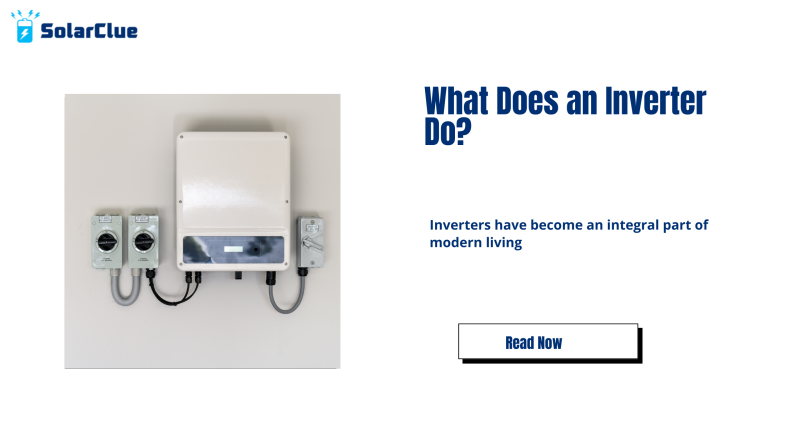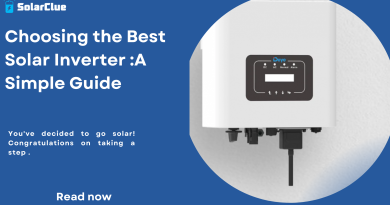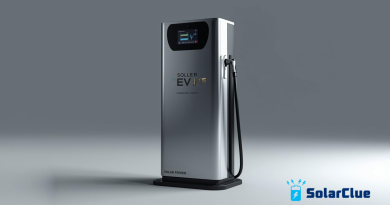What Does an Inverter Do?
In today’s world, we rely heavily on electronic devices and appliances. From our refrigerators to our computers, everything depends on electricity. But have you ever wondered what keeps these devices running smoothly, even during power cuts or voltage fluctuations? This is where an inverter comes in. You might have heard of inverters, but what exactly do they do? And why are they so important in our daily lives? Let’s break it down in simple terms.
Table of Contents
Understanding the Basics: What is an Inverter?
To put it simply, an inverter is a device that converts direct current (DC) into alternating current (AC). But what does that mean for you? Well, all the appliances in your home, like your TV, microwave, and washing machine, run on AC power. However, the electricity that comes from batteries or solar panels is usually in the form of DC power. This is where the inverter steps in—it changes the DC power into AC power, making it suitable for your household appliances.
Think of an inverter as a translator. It takes the power that’s not quite right for your devices (DC) and translates it into a language they can understand and use (AC). Without an inverter, the power from a battery would be useless for most of your home appliances.
Why Do We Need an Inverter?
The need for an inverter arises from a few different scenarios:
1.Power Cuts: In countries where power cuts are common, inverters are lifesavers. When the electricity goes out, an inverter takes over by supplying power stored in its batteries. This keeps your lights on, fans running, and essential devices powered up until the grid electricity is restored.
2.Solar Power Systems: With the increasing popularity of solar panels, inverters have become even more crucial. Solar panels generate DC electricity, which isn’t directly usable for most household appliances. An inverter converts this DC power into usable AC power, allowing you to harness solar energy efficiently.
3.Uninterrupted Power Supply: For businesses, hospitals, and other critical operations, uninterrupted power is vital. An inverter ensures that essential services continue without interruption, even during power outages.
4.Voltage Regulation: In some areas, voltage fluctuations are common. These can damage sensitive electronics like computers and TVs. Inverters can help regulate the voltage, protecting your devices from potential harm.
How Does an Inverter Work?
Let’s break down the working of an inverter in simple steps:
1.Power Source: The inverter connects to a power source, like a battery, solar panel, or the main electrical grid.
2.Conversion Process: The inverter converts the DC power from the source into AC power.
3.Power Supply: The converted AC power is then supplied to your appliances, ensuring they operate as expected.
4.Battery Charging: In cases where the inverter is connected to a battery, it also charges the battery when grid power is available, ensuring that there’s backup power when needed.
Types of Inverters
Inverters come in various types, each serving a specific purpose:
- Pure Sine Wave Inverters:
- Produces a smooth and consistent wave of AC power.
- Ideal for sensitive electronics like laptops, TVs, and medical equipment.
- Slightly more expensive but provides the best performance and safety for your devices.
- Modified Sine Wave Inverters:
- Generates a less smooth wave of AC power.
- Suitable for basic appliances like lights, fans, and simple tools.
- More affordable but may cause issues with sensitive devices.
- Square Wave Inverters:
- Produces a basic and rough wave of AC power.
- Best for very simple devices like incandescent bulbs or motors.
- Cheapest option but not recommended for modern electronics.
| Type of Inverter | Best For | Cost | Suitability for Sensitive Electronics |
|---|---|---|---|
| Pure Sine Wave Inverter | All household appliances, sensitive devices | High | Excellent |
| Modified Sine Wave Inverter | Basic household appliances, tools | Medium | Moderate |
| Square Wave Inverter | Simple devices like bulbs or motors | Low | Poor |
Benefits of Using an Inverter
- Continuous Power Supply: Whether it’s for your home or business, an inverter ensures you’re never left in the dark during a power cut.
- Energy Efficiency: Inverters help you use renewable energy sources like solar power efficiently, reducing your reliance on grid electricity and cutting down your energy bills.
- Protects Appliances: Inverters can help stabilize voltage, protecting your sensitive devices from damage caused by fluctuations.
- Environmentally Friendly: By promoting the use of renewable energy, inverters contribute to reducing your carbon footprint.
Choosing the Right Inverter for Your Needs
Selecting the right inverter depends on several factors:
1.Power Requirement: Calculate the total power (in watts) that your essential devices and appliances require during a power outage. Choose an inverter with a capacity that matches or exceeds this requirement.
2.Type of Inverter: Consider the type of devices you need to power. If you have sensitive electronics, a pure sine wave inverter is the best choice.
3.Battery Capacity: If your inverter uses a battery, ensure that it has sufficient capacity (measured in Ah or amp-hours) to run your devices for the desired duration.
4.Budget: Inverters come in various price ranges. While it’s tempting to go for a cheaper option, investing in a good quality inverter can save you money in the long run by preventing damage to your appliances.
Conclusion
Inverters have become an integral part of modern living, ensuring that our lives and work continue uninterrupted, even during power cuts or voltage fluctuations. Whether you’re looking to safeguard your home appliances, harness solar energy, or simply need a reliable backup power source, an inverter is an essential tool. Understanding how inverters work and choosing the right one for your needs can make a big difference in your daily life. So, the next time there’s a power cut, you’ll know exactly what’s keeping your lights on and your devices running smoothly!
Visit SolarClue® to see the best Solar Inverter. SolarClue® actively sells solar energy products at discounts of up to 50% on its online marketplace.
FAQs
- What does an inverter do?
- An inverter converts DC power (from batteries or solar panels) into AC power, which is suitable for running household appliances.
- Can I run all my household appliances on an inverter?
- Yes, but it depends on the inverter’s capacity. High-capacity inverters can power most of your essential devices during a power cut.
- Is it necessary to have a pure sine wave inverter?
- If you have sensitive electronics like computers, medical equipment, or modern TVs, a pure sine wave inverter is recommended to avoid any damage.
- How long does an inverter battery last?
- The lifespan of an inverter battery depends on usage, maintenance, and the type of battery. On average, a well-maintained battery can last 3-5 years.
- Can inverters help with reducing electricity bills?
- Yes, especially when used with solar panels. They allow you to harness renewable energy, reducing your dependence on grid electricity.




